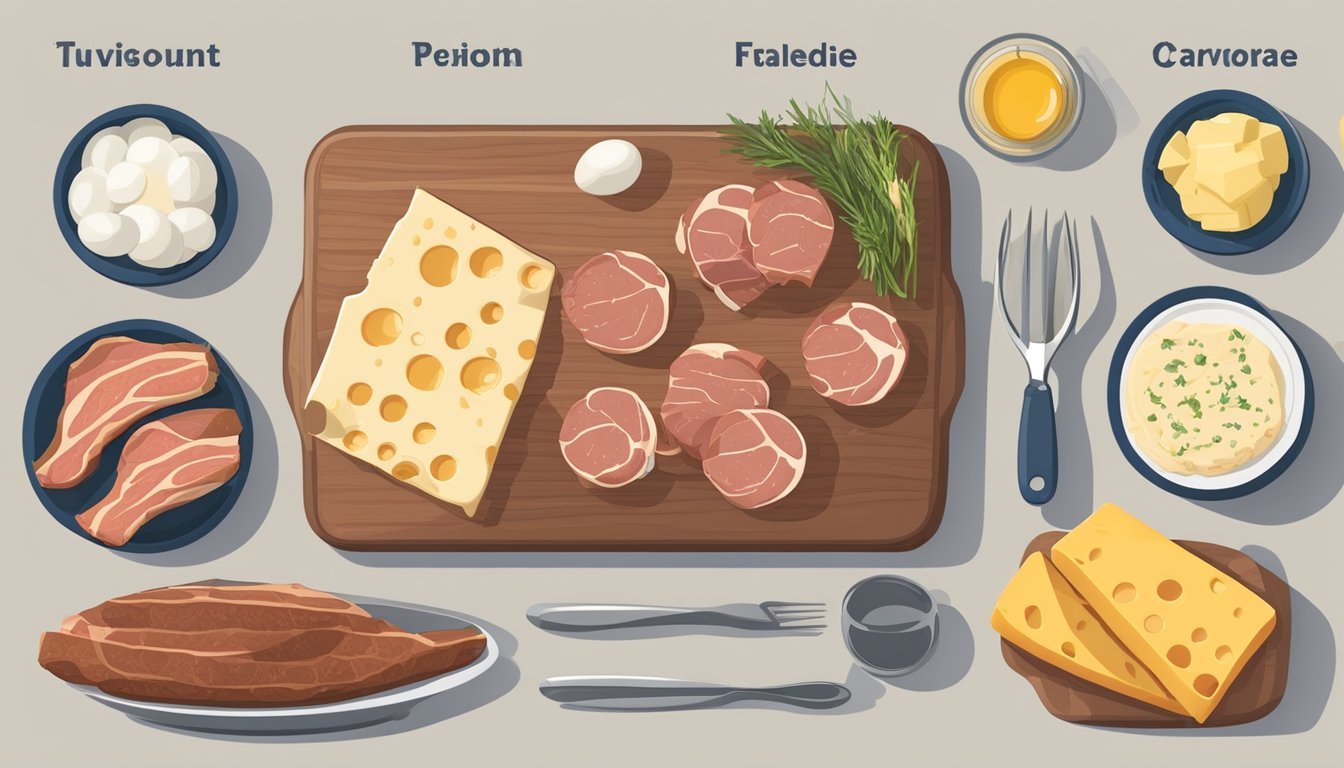How Many Carbs Carnivore Diet Contains
Unpacking the Zero-Carb Approach
The carnivore diet is an eating regimen that consists almost exclusively of animal products and is naturally very low in carbohydrates. It is a dietary approach where one consumes meats, fish, eggs, and certain dairy products while excluding plant-based foods. Proponents of this diet suggest that because the primary foods of the carnivore diet are meats, which contain minimal to no carbohydrates, the intake of carbs is essentially negligible.
Individuals following the carnivore diet do not have a specific carbohydrate limit because the dietary focus is on consuming animal-based foods that are inherently low in carbs. The absence of plant-based foods eliminates sources of dietary carbohydrates, making the carnivore diet one of the most restrictive in terms of carb consumption. Some carnivore diet adherents may consume trace amounts of carbohydrates through the incidental intake of liver or other organ meats, but these are minimal and not the focus of the diet.
Understanding the Carnivore Diet
The carnivore diet focuses on the consumption of exclusively animal products, often leading to a near zero carbohydrate intake. It emphasizes meats and rejects plant-based foods.
Core Principles and Foods
The carnivore diet is founded on the premise that human beings should consume primarily animal products. Foods central to this diet include:
Meat: Such as beef, pork, and chicken, which make up the majority of meals.
Organ Meats: These are encouraged for their high nutrient density.
Fish: A source of protein and omega-3 fatty acids.
Eggs: Included for their protein content and versatility.
Dairy: Allowed in some variations, particularly high-fat, low-lactose options like aged cheese and butter.
Zero Carb Concept and Its Implications
The idea of a "Zero Carb" diet, often associated with the carnivore diet, implies that:
Foods consumed contain little to no carbohydrates, aligning with the principle that if a food is not from an animal, it's not on the menu.
This approach inherently excludes common carb sources such as grains, legumes, fruits, and vegetables.
It's important to note that the term "Zero Carb" is a bit of a misnomer, as even animal products may contain trace amounts of carbohydrates, particularly in dairy products and organ meats. However, these amounts are negligible compared to a standard diet.
Carnivore Diet and Carbohydrates
The Carnivore Diet is a high-protein, high-fat diet that minimizes carbohydrate intake. This section explores the carb content typically consumed in a Carnivore Diet, the specific sources from which they might come, and how this regime compares with other low-carb diets like Keto and Paleo.
Typical Carb Intake on Carnivore Diet
The Carnivore Diet is structured to include virtually zero carbohydrates. Since the diet consists primarily of animal products, individuals on the Carnivore Diet may ingest incidental carbs found naturally in dairy products and eggs, but the total daily intake is generally less than 5% of total calories. This contrasts sharply with standard dietary recommendations which often include a significant portion of calories from carbs.
Sources of Carbs in a Carnivore Diet
Even on a strict Carnivore Diet, trace amounts of carbohydrates can be encountered. These incidental sources include:
Dairy: Trace carbs in cheese, butter, and heavy cream
Organs: Liver and other organ meats contain trace amounts of carbs
Eggs: Minimal carbohydrates present in the yolk
While these sources are not substantial enough to increase the overall carbohydrate percentage significantly, they are the primary means by which someone on a Carnivore Diet might consume carbs.
Comparing Carnivore to Keto and Paleo Diets
The Carnivore and Keto diets both prioritize low-carb intake, but their macronutrient distributions differ. While the Carnivore Diet suggests near-zero carb consumption, the Keto diet typically includes up to 5-10% carbohydrate intake, mostly from vegetables and nuts which are excluded from the Carnivore Diet. Keto emphasizes a state of ketosis through moderate protein and high fat intake.
Paleo, however, allows for a broader range of carbohydrate sources than Keto and is less restrictive than Carnivore. It includes fruits, vegetables, and natural sweeteners, with an emphasis on whole, unprocessed foods.
Each diet adheres to different principles regarding carbohydrate sources and intake levels, even though they all reduce carbohydrate consumption compared to standard nutritional guidelines.
Health Impacts of the Carnivore Diet
The carnivore diet, characterized by a zero-carb approach, predominantly affects weight management and blood sugar levels, with implications for heart health, cholesterol levels, and potential risks that warrant consideration for long-term health.
Weight Management
Individuals following the carnivore diet often report weight loss due to a high intake of protein and fats that can lead to a feeling of fullness and reduced appetite. This diet may assist in losing weight, as the body transitions to utilizing fat for energy, potentially increasing metabolic rates in some individuals. However, the absence of fiber could lead to issues such as constipation.
Effects on Blood Sugar and Diabetes
Adopting a carnivore diet can result in stable blood sugar levels since it eliminates carbohydrates. This may benefit individuals managing diabetes by reducing the need for insulin. Nevertheless, comprehensive studies on the long-term effects of an all-meat diet in diabetic contexts are still lacking.
Heart Health and Cholesterol Levels
The diet's high intake of saturated fat from animal products can raise concerns regarding heart disease and cholesterol. While some individuals on the carnivore diet have experienced improved lipid profiles, these results are not universal, and increased saturated fat consumption is typically associated with higher cardiovascular risk.
Potential Risks and Side Effects
Potential risks include nutritional deficiencies due to the exclusion of plant-based foods, leading to a lack of essential vitamins and antioxidants. Furthermore, the diet may increase the risk of conditions like heart disease, cancer, and kidney disease due to high levels of animal protein and saturated fats.
Long-Term Health Considerations
The long-term health impacts of the carnivore diet remain uncertain, as current scientific understanding is based on short-term studies and anecdotal evidence. There's a concern that such restrictive diets could lead to an increased risk of chronic diseases and other health issues due to the lack of plant-derived nutrients and fiber.
Nutritional Composition of the Carnivore Diet
The Carnivore Diet typically excludes carbohydrates, focusing on high intakes of protein and fat, mainly sourced from animal products. Key nutritional components include meat, offal, and sometimes dairy, which are rich in various vitamins and minerals, yet certain nutritional gaps should be addressed.
Protein and Fats: Myths and Facts
Protein is abundant in the carnivore diet, with foods like ribeye steak providing up to 25 grams per 100 grams of meat. The common myth that too much protein can harm the body is not supported by scientific evidence in healthy individuals, though one should monitor intake based on activity levels and personal health goals.
Fat constitutes the primary energy source in the carnivore diet. It’s important to balance saturated fats, found in animal fat, with mono- and polyunsaturated fats, which may come from sources like fish. The right balance aids in maintaining healthy cholesterol levels and overall health.
Vitamins and Minerals in Meat
Meat, especially liver, is a powerhouse of vitamins like A, D, E, and K, and essential minerals such as iron, zinc, and selenium. For example, beef liver contains 6.5 mg of iron and 11,000 IU of vitamin A per 100 grams.
Bone broth can serve as an additional source of minerals like calcium and magnesium, necessary for bone health and metabolic functions.
Though meat provides most B vitamins, Vitamin B12 is especially prominent, critical for nerve function and blood cell formation.
Limitations and Nutrient Deficiencies
While the carnivore diet can fulfill most nutrition requirements, it may fall short in certain areas:
Some individuals might develop nutrient deficiencies, particularly in vitamin C and fiber, as traditional plant-based sources are omitted.
To address potential gaps, inclusion of a wider variety of meats such as organ meats (like liver) becomes essential. Liver, for instance, contains small amounts of vitamin C, which could help mitigate some deficits.
Regular consumption of fish or fish oil supplements is suggested to balance omega-3 fatty acids, which are less prevalent in land animal fats.
Minerals such as potassium and magnesium might be less available in a purely carnivorous diet, potentially requiring targeted supplementation or the strategic choice of meats like bone broth that can contribute these nutrients.
Avoid the crowds and shop for vitamin C, fiber supplement, and fish oil online from the comfort of your home!
Carnivore Diet and Lifestyle
The Carnivore Diet strictly focuses on animal-based foods, excluding carbohydrates almost entirely. Adherents maintain a high protein and fat intake through meats, eggs, and certain dairy products. It requires meticulous meal planning and can lead to significant social and dietary lifestyle changes.
Practical Meal Planning and Preparation
Individuals on the Carnivore Diet typically consume a range of animal products, including beef, pork, poultry, fish, and eggs. They prepare meals that revolve solely around these components, often seasoned minimally with salt and sometimes permitting small amounts of spices. High-fat dairy products such as cheese and butter may also be included to add variety. Here is an example of a daily meal plan:
Breakfast:
4 eggs
30g aged cheese (optional)
Lunch:
300g Ribeye steak
Dinner:
Pork chops cooked in butter
Chicken breasts with a slice of cheddar cheese (optional)
Beverages like coffee and tea are generally permitted by some individuals, so long as they are consumed plain and without sweeteners. In contrast, alcohol rarely fits within the diet due to its carbohydrate content and its potential to disrupt ketosis, the metabolic state that many on the carnivore diet aim to achieve.
Social and Lifestyle Adaptations
Individuals following the Carnivore Diet may find social gatherings and dining out challenging, as this diet deviates significantly from typical eating patterns. They often need to communicate their dietary restrictions when attending events or when eating at restaurants to ensure their meals are compliant. For instance, they might request dishes without sides of grains or vegetables, or they may opt for plain meat-based options where possible.
Adoptees of the Carnivore Diet lifestyle often find themselves preparing the majority of their meals at home to maintain strict compliance with the diet's guidelines. They become accustomed to sourcing high-quality animal products and may need to invest more in grocery shopping to prioritize grass-fed, organic, and sustainably raised meat options.
Scientific Research and Expert Opinions
The carnivore diet, essentially void of carbohydrates, has been subject to research and debate among experts, with some highlighting its historical precedent and others cautioning against potential nutritional deficiencies.
Studies on Carnivore Diet Outcomes
Scientific studies on the carnivore diet are relatively few but have provided some evidence on its outcomes. Research has investigated the diet's impact on health markers such as blood sugar levels and inflammation, noting potential benefits for individuals with diabetes and autoimmune conditions. Participants in these studies often report significant weight loss and improvement in metabolic health. However, the body of evidence is still growing, and there's a need for more comprehensive, peer-reviewed research to fully understand the long-term effects of a zero-carb dietary regimen.
Notable Advocates and Detractors
Dr. Shawn Baker, an orthopedic surgeon, is a prominent proponent of the carnivore diet. He argues for its efficacy based on both historical patterns of human nutrition and outcomes he has observed in a survey of individuals adhering to the diet. On the other side of the spectrum, many registered dietitians and nutrition scientists warn against the exclusion of plant-based foods, which can lead to nutrient deficiencies and long-term health risks. Their concerns are grounded in the broad consensus about the value of dietary diversity and the role of carbohydrates in a balanced diet.
Addressing Common Questions and Concerns
This section explores the effects of the carnivore diet on various aspects of health and performance, providing clarity on common inquiries.
Carnivore Diet and Physical Performance
Individuals may question how a zero-carb, high-protein diet influences physical performance. The carnivore diet, being rich in protein, can support muscle maintenance and growth. However, athletes might experience a period of adaptation as the body shifts from using carbohydrates to fats for fuel, a state known as ketosis. For endurance sports, this might initially result in a perceived decrease in energy.
Impact on Sleep and Mood Disorders
The relationship between diet and sleep quality or mood disorders such as depression is complex. Some individuals find that a diet void of carbohydrates, like the carnivore diet, leads to improvements in sleep quality due to the stabilizing effect on blood sugar levels. However, this diet could potentially exacerbate mood disorders in some, emphasizing the importance of monitoring one's mental health closely.
Handling Digestive Changes
When one switches to a carnivore diet, changes in digestive function are common. Given the absence of fiber, one might experience symptoms such as diarrhea or constipation. These symptoms may lessen as the digestive system adjusts to a strictly meat-based plate. Ensuring adequate intake of water and electrolytes is critical during this transition.
Customizing the Carnivore Diet
While the standard carnivore diet may promote the idea of all meat and no carbs, some individuals may opt for customization, especially to manage conditions like arthritis. Including organ meats to provide a range of nutrients and adjusting protein intake to meet individual needs can be an effective strategy. It’s essential that each person listens to their body and adjusts the diet as needed to optimize health outcomes.
Considerations for Special Populations
When adapting the carnivore diet for specific populations, it is crucial to consider activity levels, age, and any pre-existing health conditions. Certain groups may require modifications to their diet to meet their unique nutritional needs.
Carnivore Diet for Athletes
Athletes typically require a higher intake of nutrients to support their increased energy expenditure. Lamb and salmon are excellent choices for the carnivore diet as they not only provide high-quality protein but also essential fatty acids that support muscle recovery and energy levels. For athletes, incorporating bone marrow can be beneficial due to its nutrient density, providing vitamins and minerals important for overall health.
Lamb: high in micronutrients and protein
Salmon: rich in Omega-3 fatty acids
Bone Marrow: source of vitamins, minerals, and healthy fats
Adapting to Age-Related Dietary Needs
As individuals age, their dietary needs evolve, often requiring lower caloric intake and closer management of macronutrient ratios. Seniors with concerns such as high blood pressure should be cautious of the sodium content in their diets, which might be elevated due to the consumption of processed meats. Instead, they should focus on naturally low-sodium animal foods, maintaining a balance that supports their health condition without exceeding recommended sodium intake.
Nutrition Adjustments for Seniors:
Opt for low-sodium meat options.
Limit processed meats to manage sodium intake.
Select nutrient-dense foods like bone marrow to provide vitamins and minerals without excess calories.
Carnivore Diet Variations
The Carnivore Diet, traditionally known for its all-meat approach, permits variations that accommodate low to no-carb plant foods and hybrid dietary methods aligning with ketogenic principles.
Incorporating Select Plant Foods
Those following the Carnivore Diet may modify their regimen to include plant foods that are low in carbohydrates. Such additions may entail:
Vegetables: Minimal to zero-carb options like leafy greens.
Fruits: Very limited quantity; selections typically include small servings of berries.
Nuts and Seeds: Rarely, if ever, due to their higher carb and anti-nutrient content.
This approach maintains a low-carb focus, ensuring minimal impact on the diet's fundamental principles.
Hybrid Dietary Approaches
Some individuals tailor their diet to align with the Ketogenic Diet, effectively merging carnivorous and ketogenic tenets. The key macronutrient ratios for a ketogenic variant are:
Fats: Approximately 70-80% of daily calorie intake.
Protein: Kept moderate, around 20-25%.
Carbohydrates: Limited to 5-10%, primarily from permitted plant sources.
Hybrid diets may include more flexibility, occasionally integrating dairy or specific fruits and vegetables suitable for a ketogenic macro distribution. They aim to induce ketosis, utilizing fat as the principal energy source while still centering on high-quality animal products.












